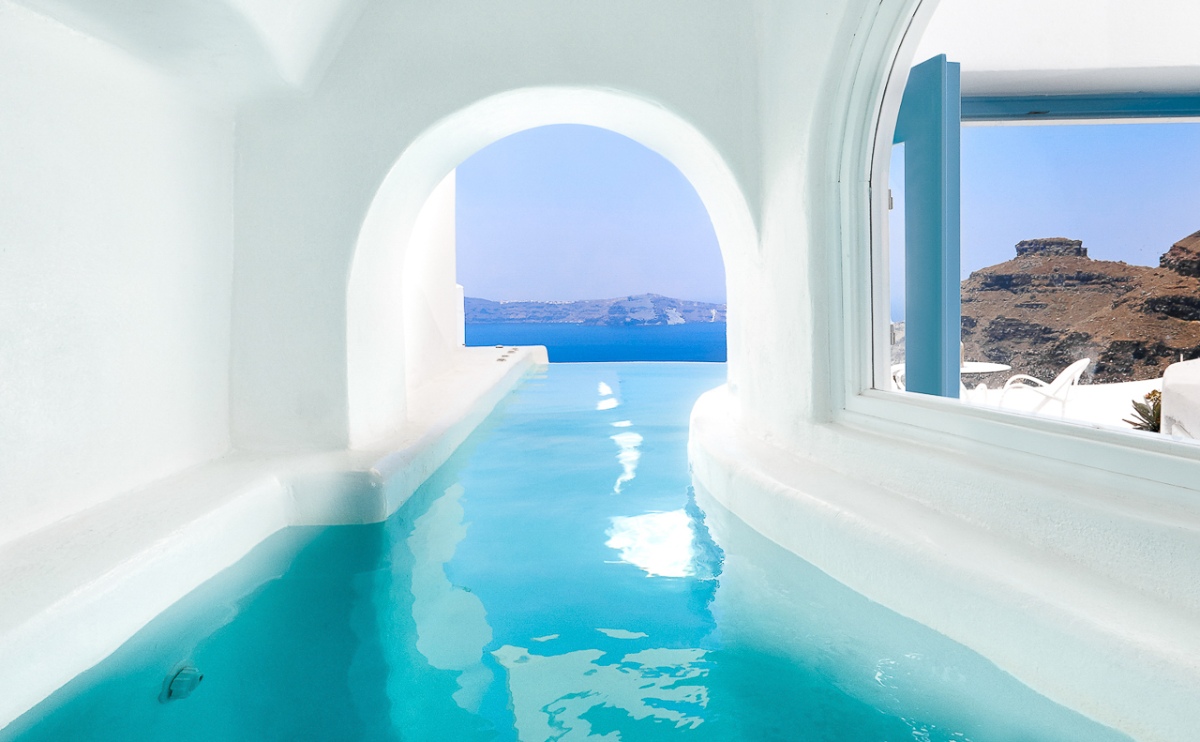Can there be a better combination of essential sights, sounds, and tastes of Greece starting from the sheer splendor of Athens, the lifestyle of Mykonos, and the iconic landscapes of Santorini?
Walk the open-air museum capital of Athens before sailing to the islands’ whitewashed sugar-cube houses, narrow alleys with local shops, Europe’s best sunsets, pristine beaches, and delicious Greek cuisine.
Follow my essential 7-10 days detailed itinerary to visit Athens, Mykonos, and Santorini and find out how to organize this epic island-hopping trip for first-timers to Greece.
Tips for first-time travelers to Greece
This journey is a major sightseeing tour with several beach days included.
So, pack light, ideally only with hand luggage, avoiding the long queues and lost items around airport baggage claims. You can buy bulky items (like towels and sunscreen) cheaply in Greece.
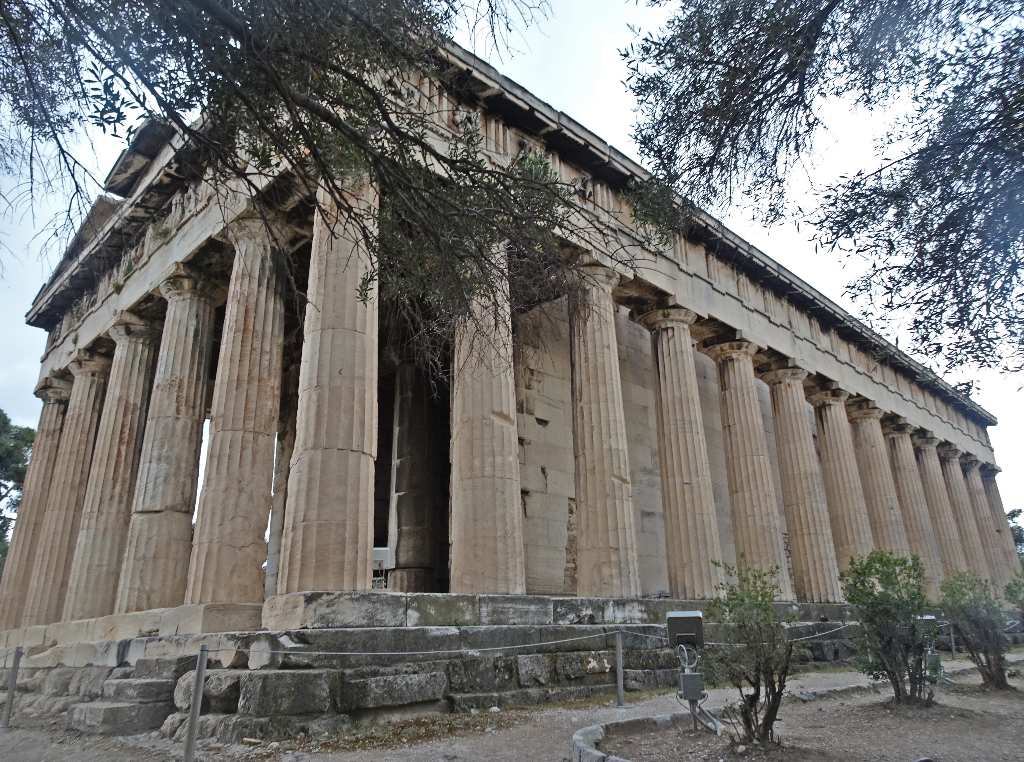
Carry with you just the petty cash (around 300 Euro per person), Greece is a credit card payment paradise, POS systems are everywhere. (But sometimes not working!)
Although you could visit Athens, Mykonos, and Santorini in as little as 4 or 6 days, it would be hectic. All you will be left with is a tired body and a mix of random experiences.
Better leave out one of the two islands if you only have 6 days for your holiday. One week is a minimum for first-time visitors taking a trip to Greece if it includes Athens and two Greek islands.
The country is much more than its landmarks and it’s what most experienced travelers to Greece prefer – soaking up a locals’ way of life, so leave plenty of unscheduled time to roam and discover Greece yourself during your trip.
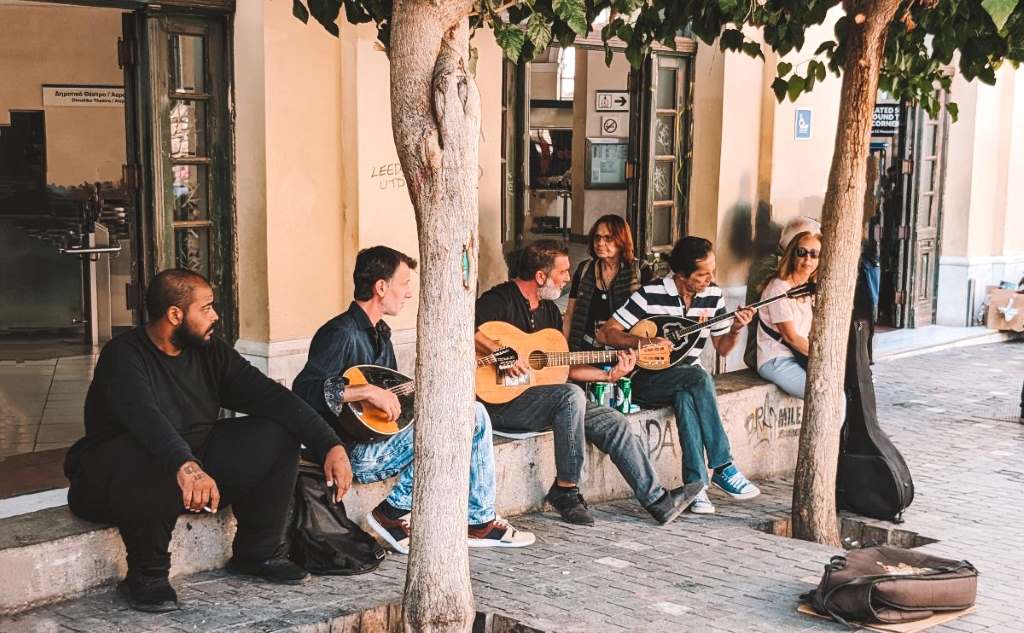
Athens, Mykonos, and Santorini are the top 3 visited locations in Greece, so try to avoid traveling during the High Season (July and August).
Prices skyrocket (they actually double in August on the popular islands!) and the crowds can be overwhelming. Shoulder season (May, June, and mid-September) is the best time to travel.
Map of Athens
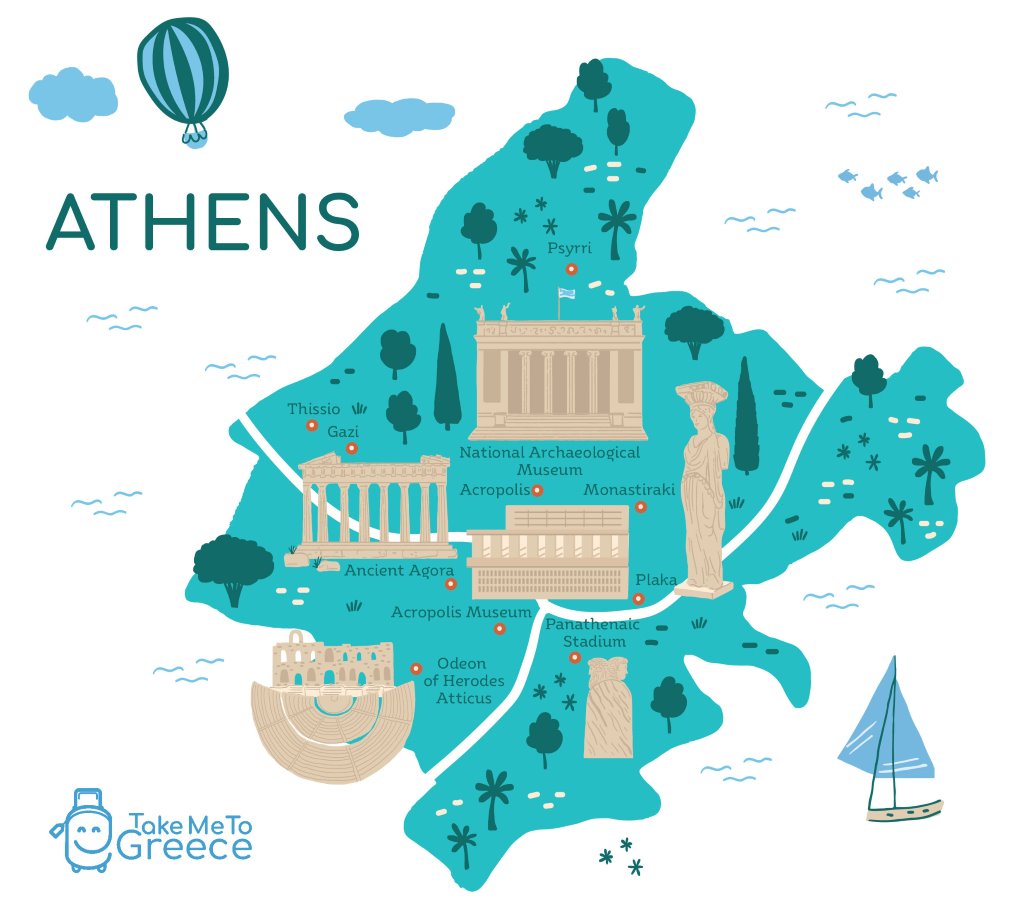
Athens’ most important archaeological sites
Athens has so much to offer, but the major archaeological sites are definitely:
-
1) The Acropolis – Ancient Greek citadel in the center of Athens with temples and historical buildings not to be missed – the Propylaea, the Temple of Athena Nike, the Parthenon, the Erechtheion, and the Theater of Dionysus.
-
2) The Acropolis Museum – a thoroughly modern museum showcasing the treasures from the Acropolis and its slopes
-
3) The Ancient Agora – large archaeological site below the acropolis with buildings from ancient Greek public life. The Stoa of Attalus and the Temple of Hephaestus are here
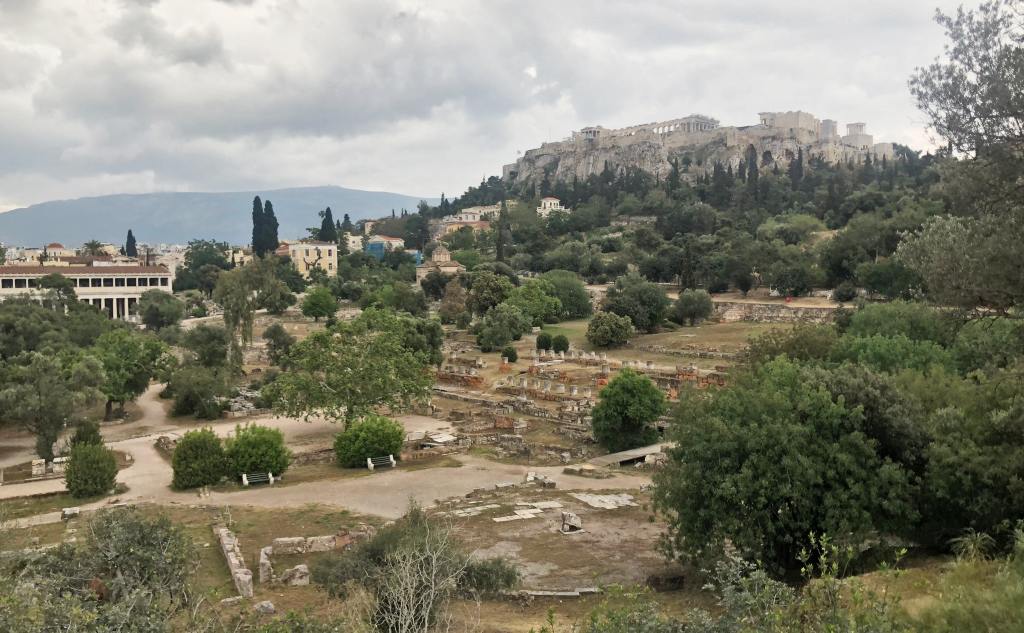
-
4) Hadrian’s Library – remains of a magnificent Roman library built in 132 A.D.
-
5) Temple of Olympian Zeus (Olympieion) – remains of the central Zeus’ temple of Ancient Athens. Always covered in scaffolding but deeply impressive because of its monumental size
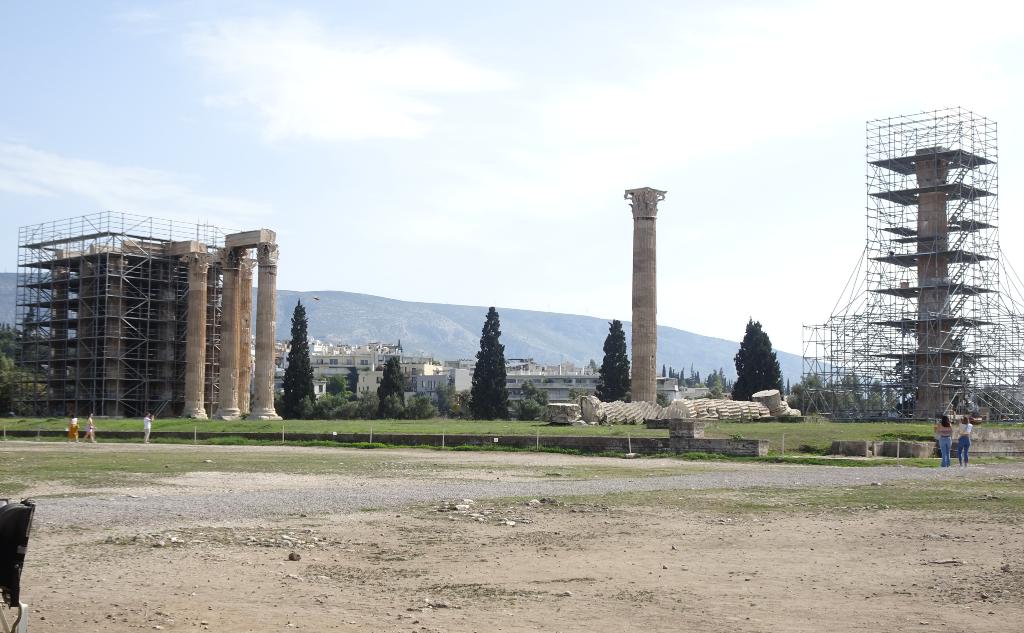
-
6) Arch of Hadrian – ceremonial grand gate built for Emperor Hadrian in 132 AD. Next to the Temple of Olympian Zeus, framing a terrific view of the Parthenon.
-
7) The Roman Agora – archeological remains of the ancient Athens’ open market, beside Hadrian’s Library and containing the Temple of the Winds
-
8) Odeon of Herodes Atticus – Ancient Roman theatre complex built in stone below the Acropolis. One of the very best ancient theaters in the world
-
9) Kerameikos – Ancient Athens’ cemetery with a small museum attached. The beginning of the Sacred Way.
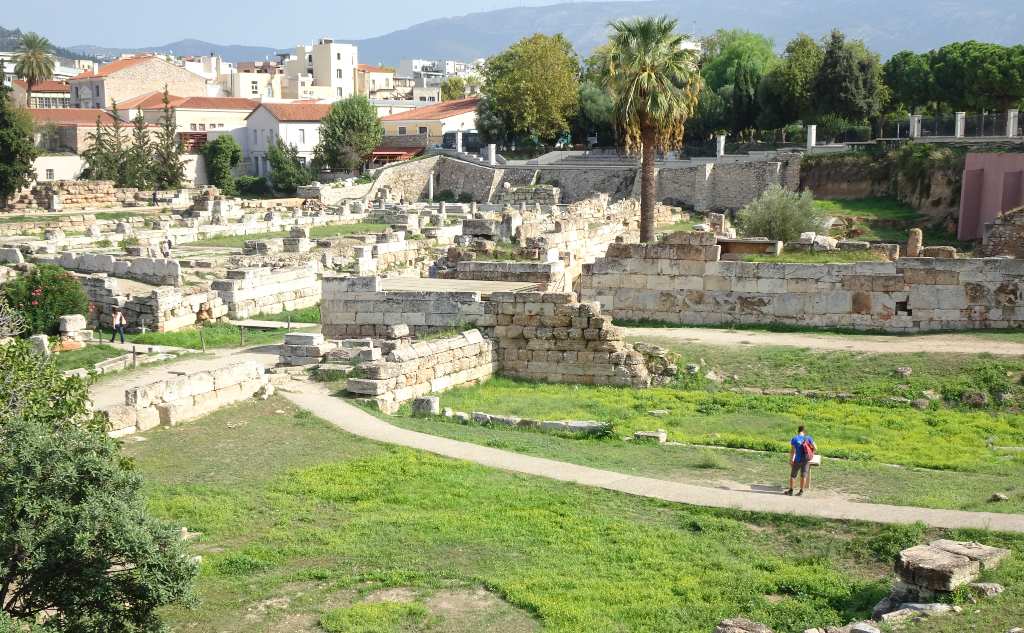
-
10) The Panathenaic Stadium – An ancient sports stadium built entirely of white marble and used for the first modern Olympic Games in 1896.
🏛️ Athens Ruins: A Guide to the best ancient Greek sites of Athens
🏛️ Best Athens Hotels Near the Acropolis
🏛️ Visiting the Acropolis: Acropolis Entrance Fees, Hours, Best Tickets +Tours
🏛️Essential Acropolis Self-Guided Walking Tour for 2024
Most of these major sites are covered by one simple combination ticket that will save you a lot of time and money.
It’s a smart solution that lets you skip the lines at the Acropolis’ ticket counter and enables a visit to 6 other important archaeological sites of Athens.
Day 1 Athens – arrival, orientation, and a little sightseeing
You’ve just arrived in Athens and the first thing you notice is the sun – it is shining bright and feels very strong.
Hopefully you’ve chosen a central area to stay – for example, historical Plaka, the oldest neighborhood of Athens just below the Acropolis, an area with most of Athens’ ancient sites.
It’s also a place with most of the pedestrian-only streets, neoclassical townhouses, and marble cobblestone alleys dotted with small shops, restaurants, and galleries.
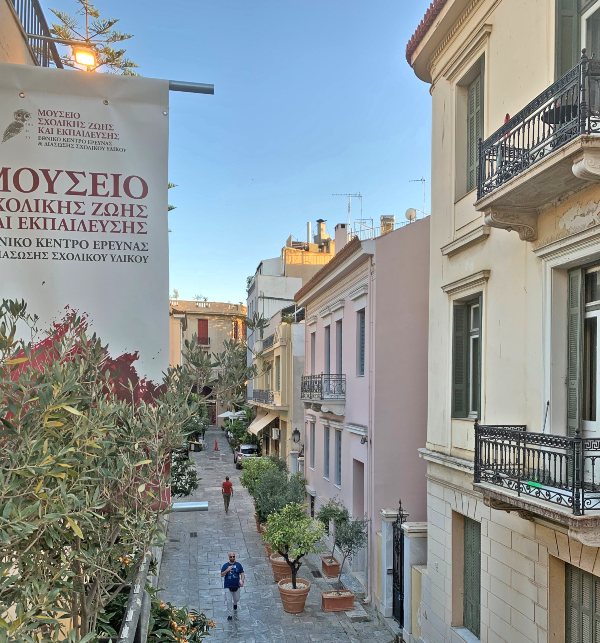
When staying in Plaka, most of the landmarks are within a walking distance and you can use the nearby Acropolis metro station to move around the city.
So, the first thing you do is explore your neighborhood with a freddo espresso in hand, soaking up the urban vibe and planning tomorrow’s visits.
You quickly realize Athens is a unique combo of ancient and super-contemporary, megalopolis of the Mediterranean where everyday life happens in every square inch of space around Athens’ historical heritage.
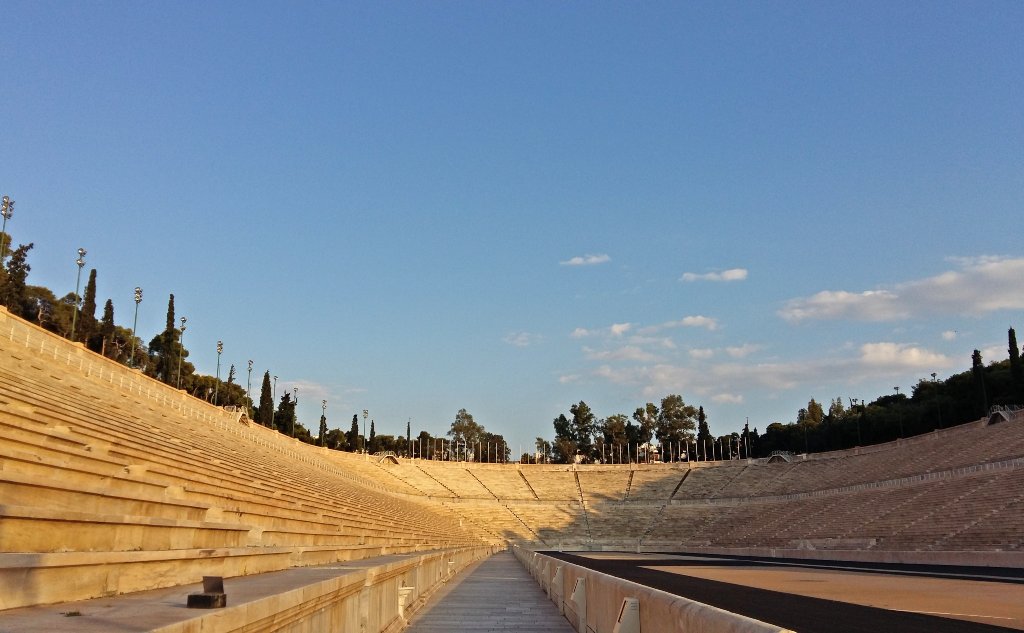
Grab a cab, Uber, or hop-on hop-off tourist bus or the wonderful trolley bus no. 2 to see the:
(i) all-marble Panathenaic Stadium,
(ii) National Gardens that end with the former Royal Palace, nowadays the Greek Parliament on Syntagma Square (where the changing of the guard occurs), and the
(iii) famous Athenian trilogy – the neoclassical buildings of the Academy, the National Library, and the University.
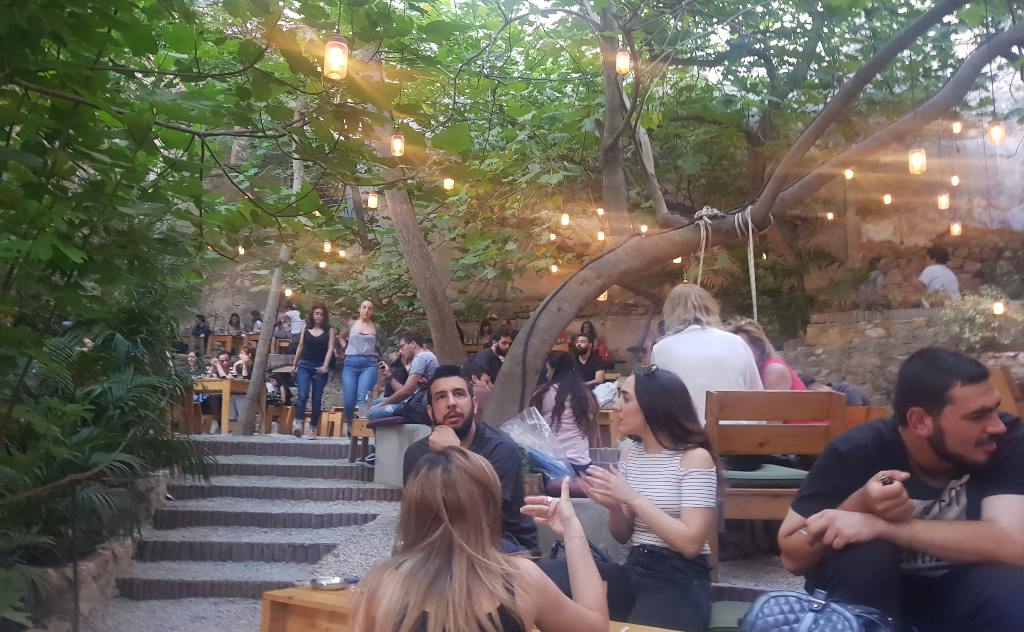
Have dinner along the steps and main streets that lead from Plaka to the Acropolis – you’ll have wonderful views of the Acropolis at night.
I always stay around this area so I can look out my window and see the Parthenon lit up at night.
Day 2 Athens – Bucketlist Ancient History
Start your day with a Greek favorite breakfast – vanilla custard bougatsa and a Greek coffee. Arrive EARLY to the Acropolis to see the Parthenon before the crowds and the heat appear by 11 am.
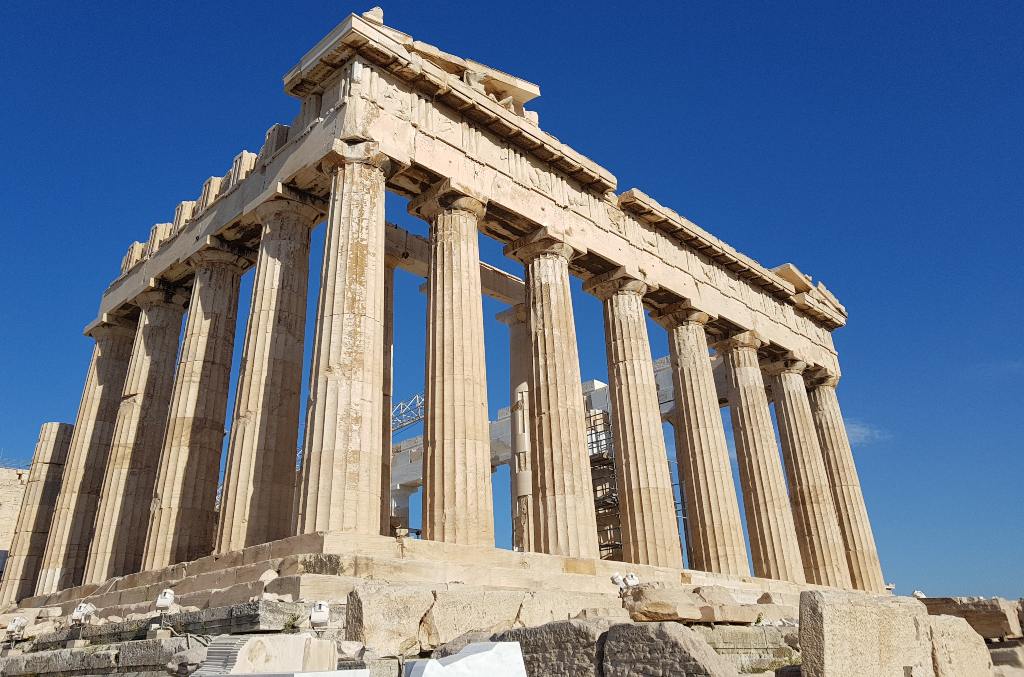
Once done, hit the wonders of Dionisiou Areopagitou Street and the Odeon of Herodes Atticus, before proceeding to the locals’ neighborhood of Koukaki for lunch or a snack.
Tip: The best sandwiches in town are at Guarantee, 41 Veikou Street.
You’ve already seen a lot today, but now you get to wander around the astonishing (and air-conditioned) Acropolis Museum, a modern building nestled between the posh mansions on Athens’ most prestigious street.
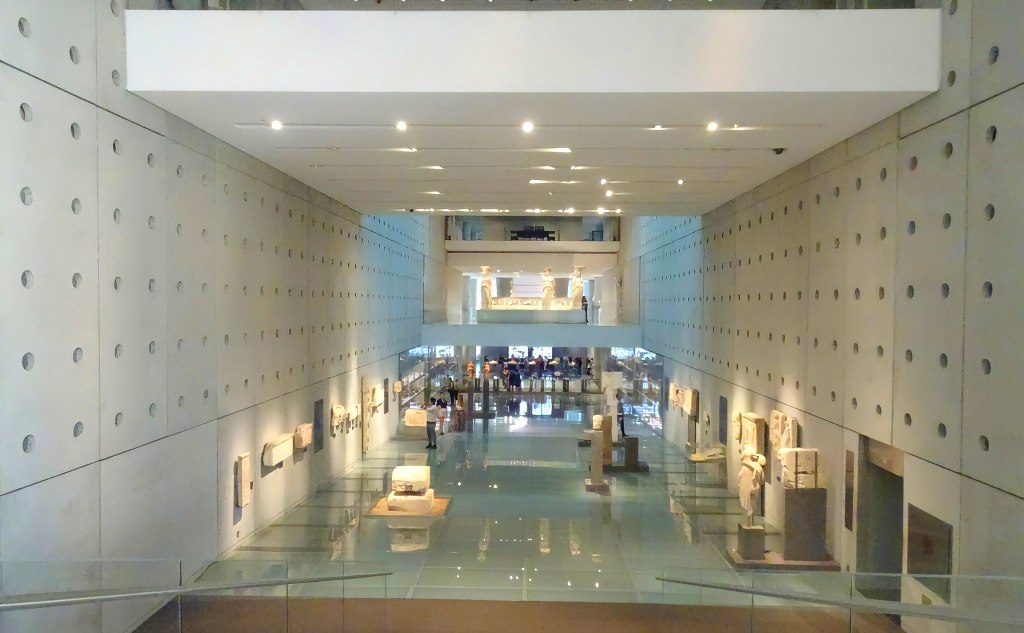
End your day in one of Psirri’s bars or the local’s favorite fish and seafood tavern, “Atlantikos.”
Day 3 Athens – Classical Athens (in a 10-day itinerary)
If you are on a whirlwind tour of Athens, Mykonos, and Santorini, today is a day you would cut out, and instead head straight to Mykonos (see Day 4).
By now you’ll be getting a feel for the way that Athens’ historical sites are close to food and shopping areas, and to the little neighborhoods that radiate out from the Acropolis and the Plaka area.
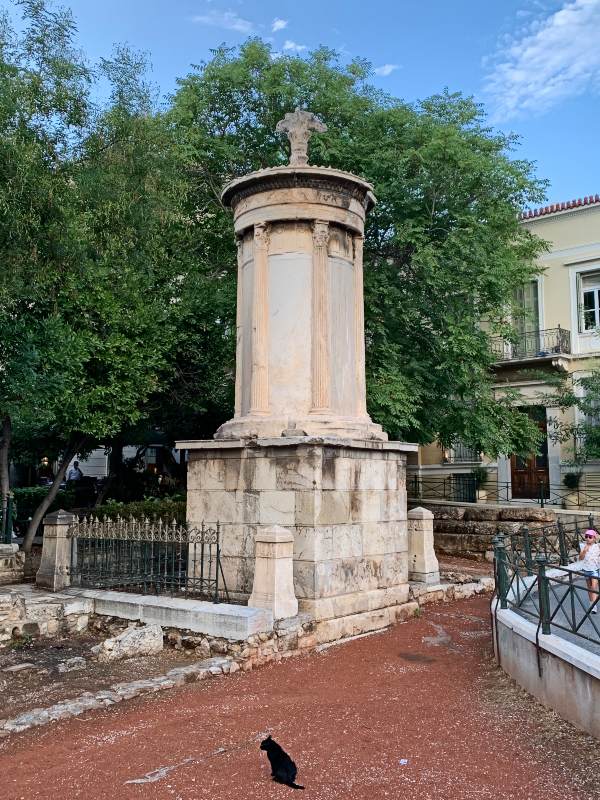
Continue your brief Athens stay by exploring the cobblestone streets of the old Athenian neighborhood Plaka via Lord Byron Street (Vyronos) and Lysicrates Square.
On Lysicrates Square you’ll find an imposing ancient Greek monument still just a few dozen meters from the famous Olympieion and the Arch of Hadrian.
For freshly squeezed juices head to Utopia in Gkoura street.

Next stroll through the Anafiotika part of Plaka before heading down to visit several more of the top Athens archaeological sites – the Ancient Agora (the Stoa of Attalos), Hadrian’s Library, the Tower of the Winds, The Roman Agora, The Temple of Hephaestus.
It will take you two to four hours to see these sights, depending on your ticket (if it’s a skip-the-line-e-ticket and the size of the queues).
Once you have seen these sites you can congratulate yourself because you have seen the majority of impressive sites of Ancient and Classical Greece.
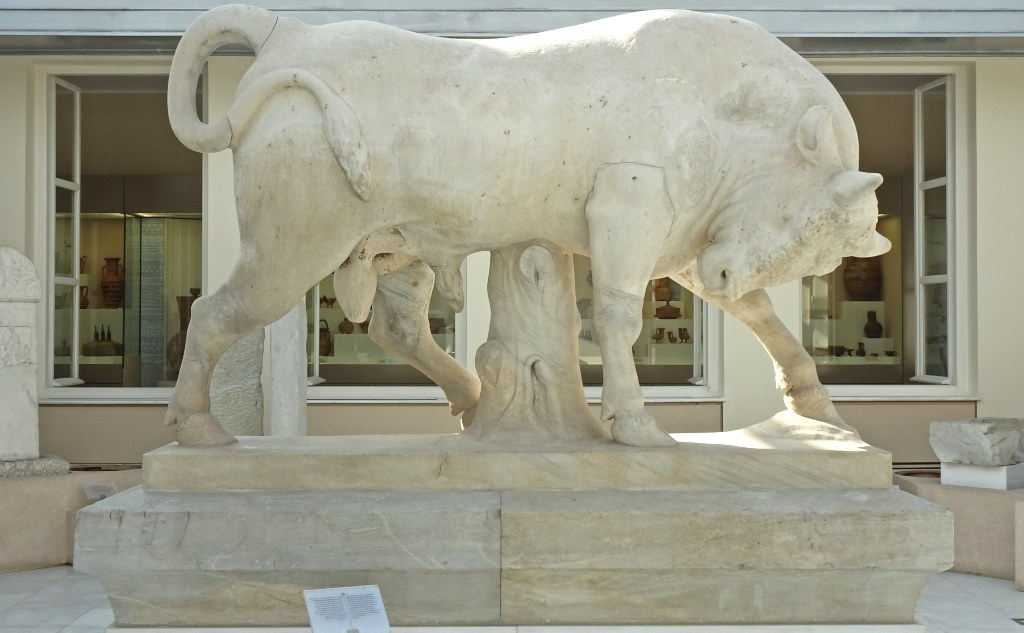
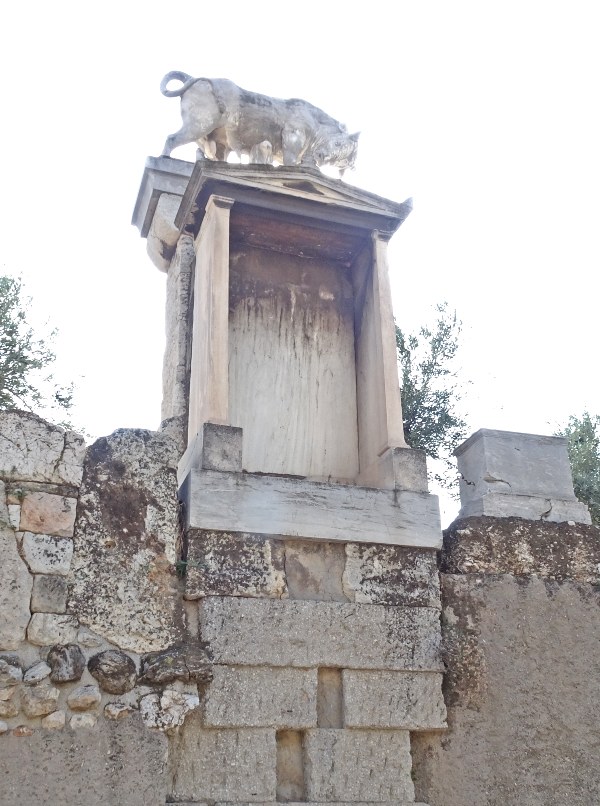
If you have the energy and time, head now to the Kerameikos Cemetary and Archaeological site.
Here you’ll discover the ancient Greek cemetery, the Potter’s Quarter, and the beginning of the Sacred Way that leads to Ancient Eluesis, where the Eleussinian Mysteries were practiced.
Tip: Don’t tread on the turtles!
If you don’t have the energy to see Kerameikos- it’s ok, you’ll be back!
Instead, cross the street and find yourself in the busy Monastiraki area, with artisan shops, taverns, bars, and even a flea market.
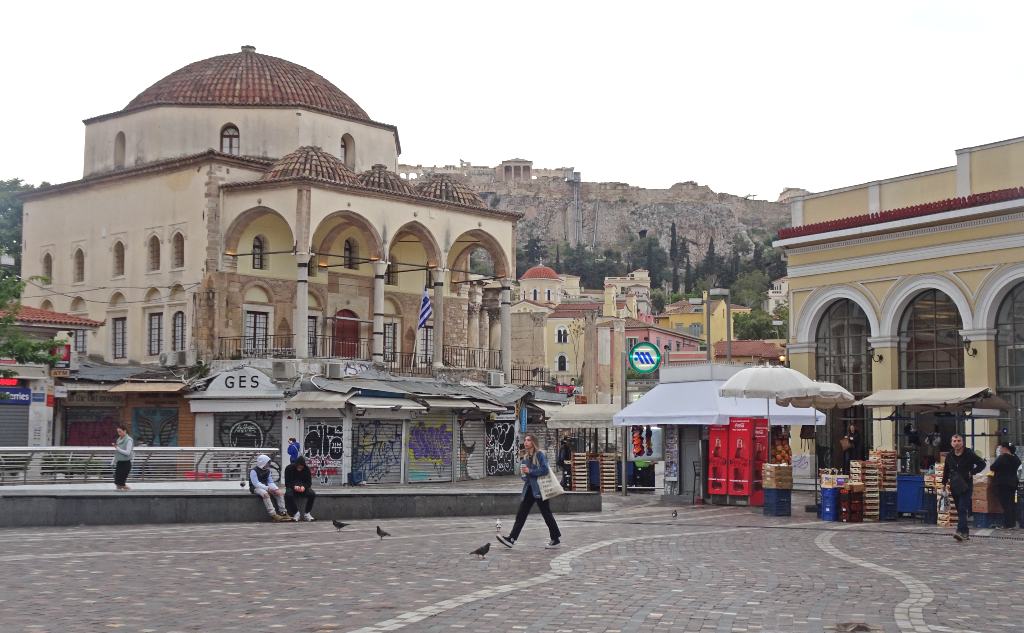
Grab lunch then a €5-7 cab or UBER to the National Archaeological Museum. This museum is simply one of the very best in the world and seeing it and the Acropolis Museum on your first trip to Athens will give you a fantastic understanding of why the Greeks are so rightfully proud of their history and culture.
(if you prefer modern Greek history, you could instead visit the Benaki Museum. It has free entry on Thursdays and great rooftop bar).
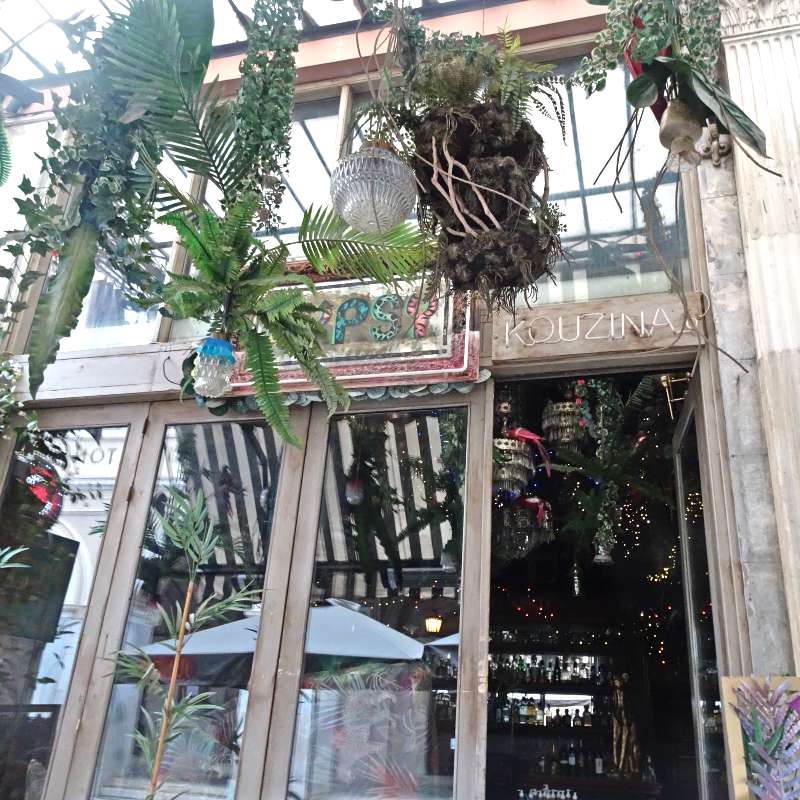
End your day with a dinner at ERGON House and a cocktail on its rooftop Acropolis view Retiré bar. If you prefer the nightclub scene, Athens has a frenetic scene focussed around Plaka.
Map of Mykonos
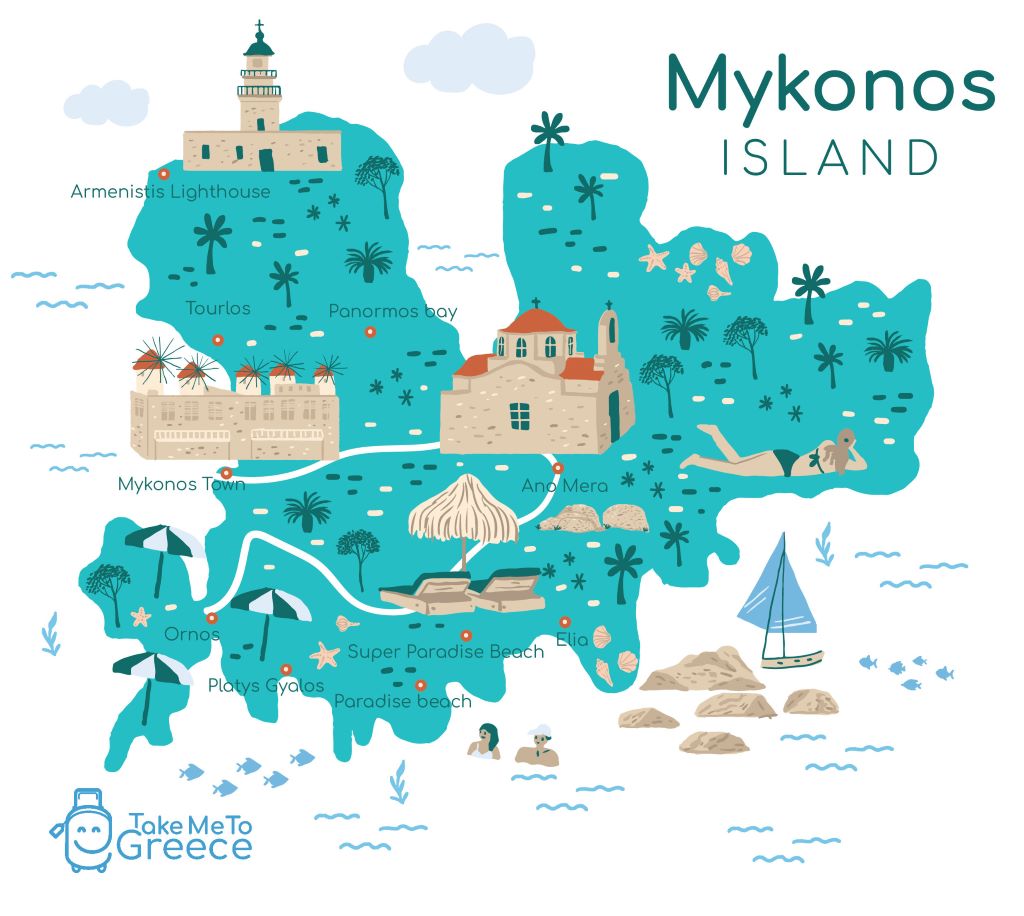
Day 4 Athens to Mykonos – arrival by ferry
Ferry arrivals to the islands are iconic and not to be missed by favoring flights.
The docking and the rush around the port are some of the most memorable Greek island experiences, plus you get to see several other islands along the way.
The ferry from Athens to Mykonos will leave from Piraeus or Rafina Port and you will leave your luggage in the hold (you’ll be directed to the correct luggage rack). There are different luggage racks for different islands!
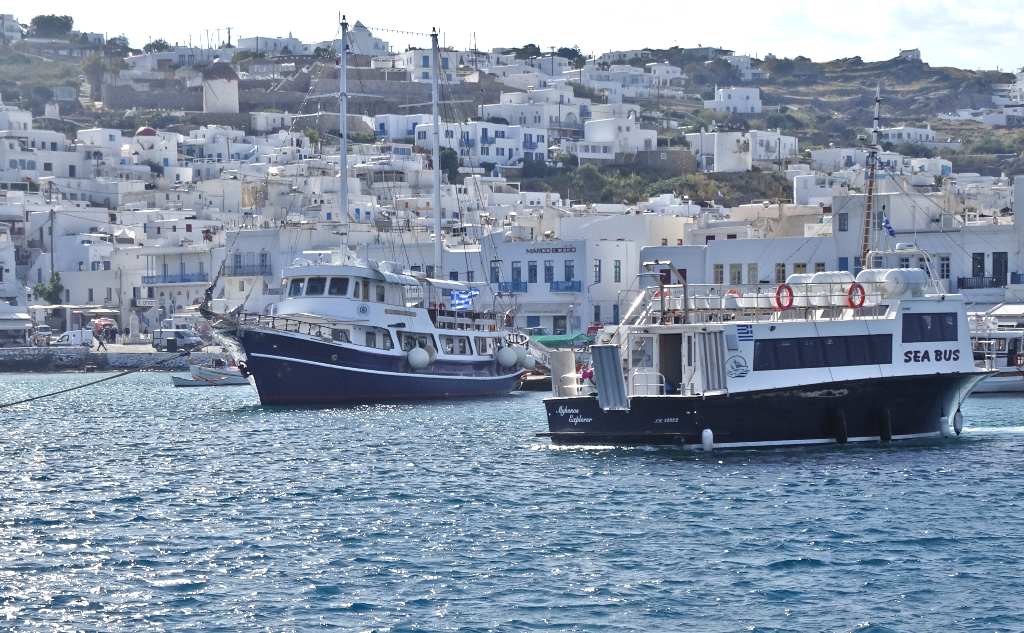
There’s food and wifi on board (for a fee) but try to spend some time up on deck (with a windproof jacket) and see just how dark the Sapphire-colored Aegean Sea is, and how close to each other the Cyclades islands are.
Take a Sea Bus or taxi to your accommodation (€40+). You can also walk from the New Port to Mykonos town.
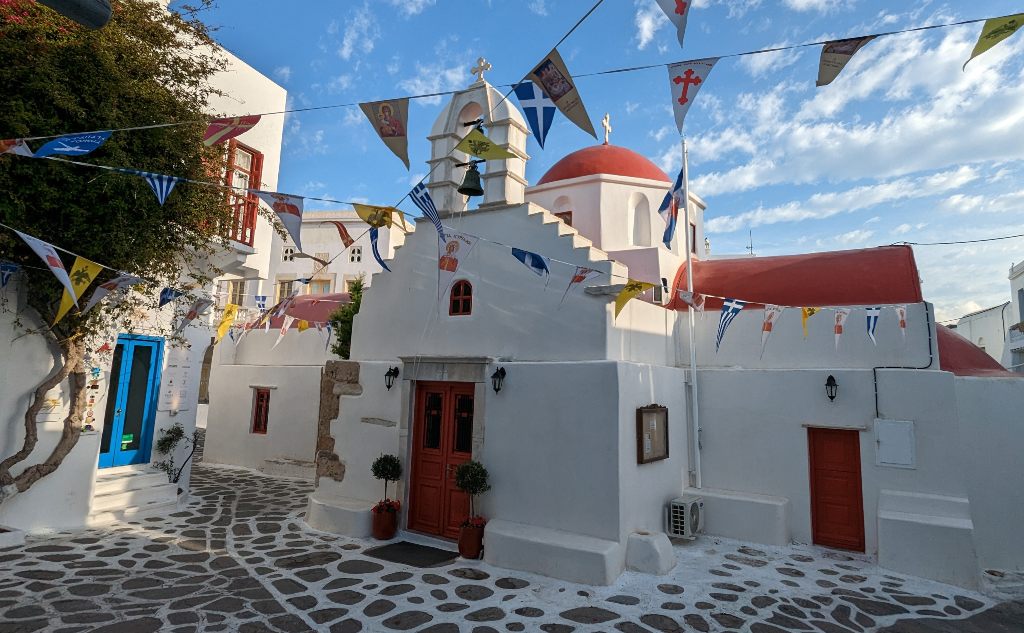
Get yourself checked in and start exploring the maze-like narrow alleys of Mykonos Town (Chora), and the unique tiny waterbank called Little Venice with its colorful houses hanging above the Aegean waves.
Walk from Little Venice to the famous Windmills, and then on the other side of Little Venice, visit the Church of Panagia Paraportiani, a uniquely white and curvy Byzantine church with mellow blue interiors.
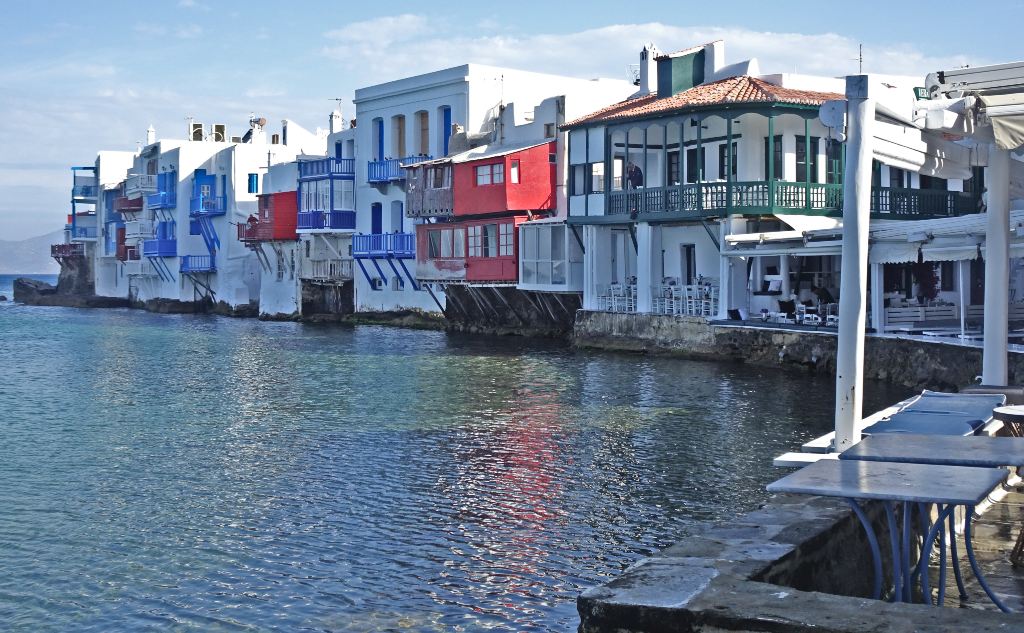
Day 5 Mykonos – beaches and relaxation
Today is beach relaxation day and you can choose from the south-facing coves of Mykonos offering vivid lifestyle, lounge-style beach clubs and parties around Paradise, Super Paradise, Psarrou, Plati Gialos, and Paraga beaches.

If you prefer a quiet setting with a more tranquil atmosphere, head to Agios Stefanos, Kapari, Kalafatis, or Lia beaches.
You’ll pay a lot for sun loungers, meals, and drinks, but this is why you came to Mykonos, so soak it up and enjoy it!
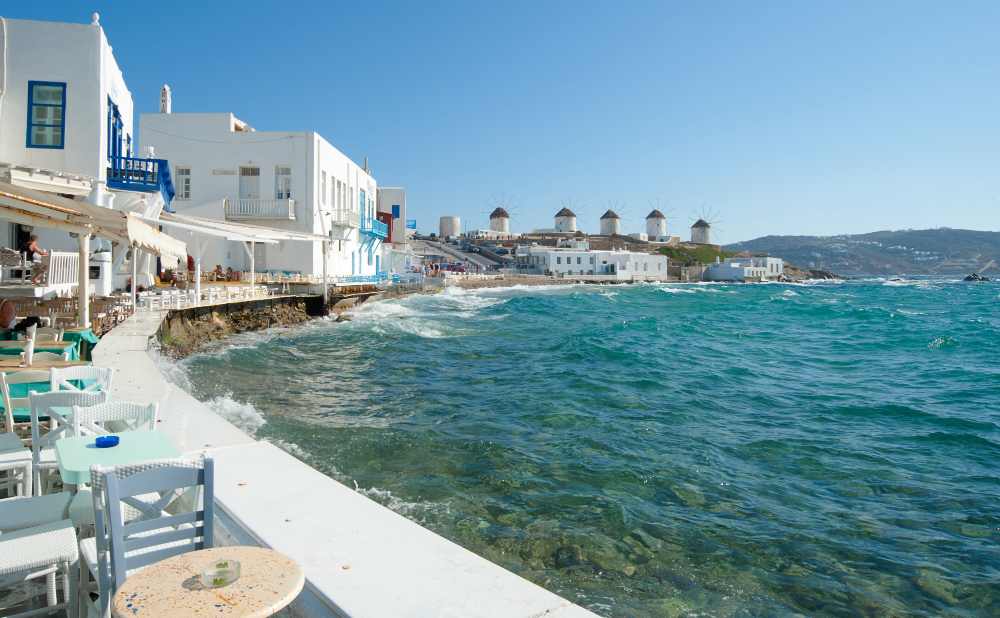
In the evening, stroll around the Old Harbor, shop for souvenirs in Matogianni Street, or head out to have a drink around the Armenistis Lighthouse to watch the sunset.
Most people only make it as far as the Windmills for sunset because it’s close to places to eat, but if you feel like getting away from the crowds, you’ll have a wonderful view. It’s 6.5 km/4 miles from Chora to the lighthouse.
Day 6 Mykonos – Delos (in a 10-day itinerary)
The extra Mykonos day is perfect for the half-day trip to the nearby island of Delos, a political, spiritual and symbolic center of the ancient island world and home to the world-famous Delos lion statues.
Buy an online e-ticket for the round trip on the Delos Tours boat to Delos Island.
You’ll have 3 hours to spend on Delos Island, unless you take the morning bus out to the island and wait to get on the late afternoon return bus, in which case, you’ll have 6 hours.
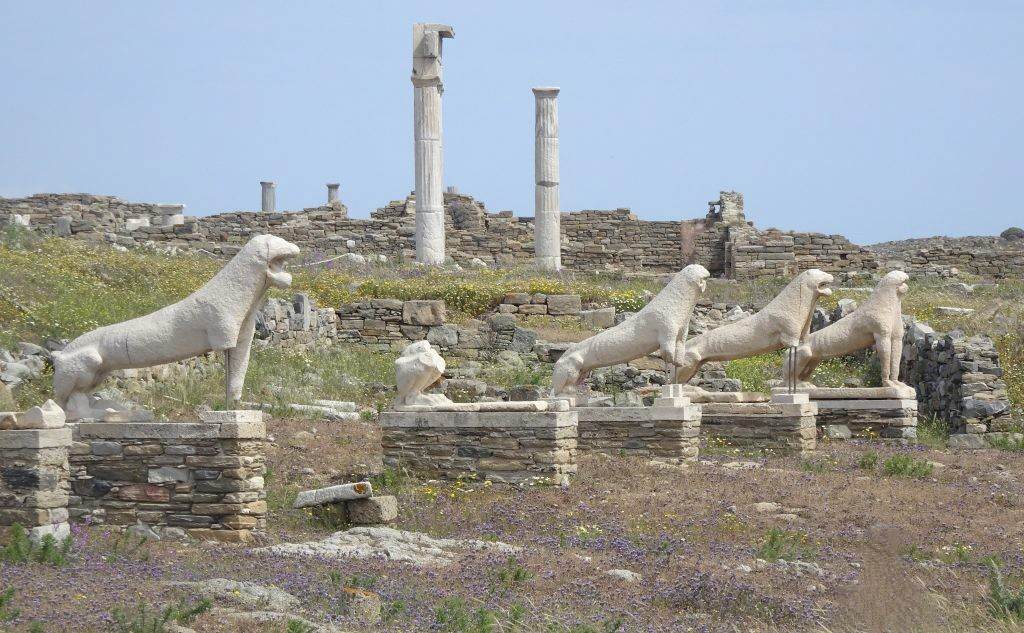
Upon return to Mykonos, if you want more island adventuring, head inland to Ano Mera, the island’s second settlement to discover the icons of Panagia Tourliani Monastery, or visit Chora’s Folklore Museum.
You could also tour a winery instead or just head to the beach or hotel pool!
Tip: If you have chosen a 7-day itinerary and you love ancient sites, I would still get out to Delos, perhaps as a private boat trip so that you can fit it into your schedule and still see Mykonos Chora.
Day 7 Mykonos to Santorini – arrival by ferry
Santorini, the holy grail of the Greek islands, opens up as you approach its port from the submerged caldera and step on its volcanic soil.
Map of Santorini
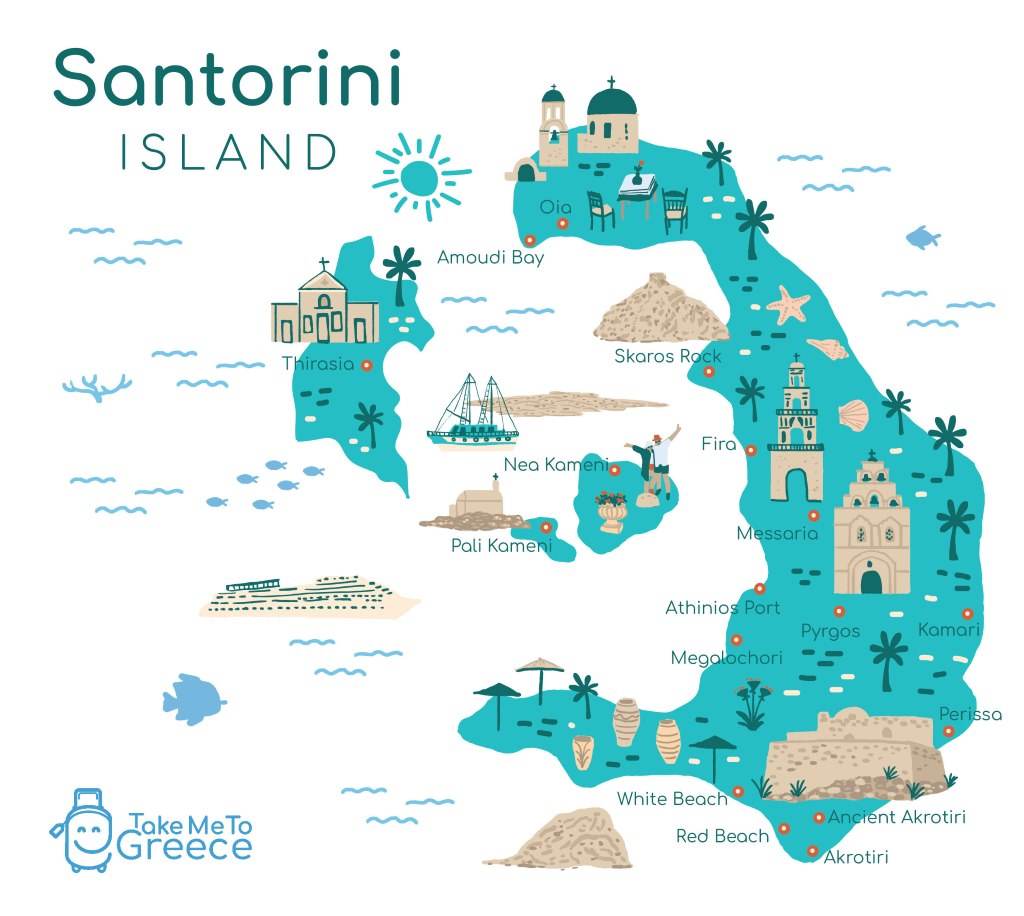
Athinios Port and Oia Village
Have a pre-booked transfer to get out of the congested Port area (there’s only one switchback road to and from Athinios Port and taxis are in short supply and expensive).
Once you’ve settled into your hotel, head to Santorini’s (and Greece’s) most charming village – the famous Oia.
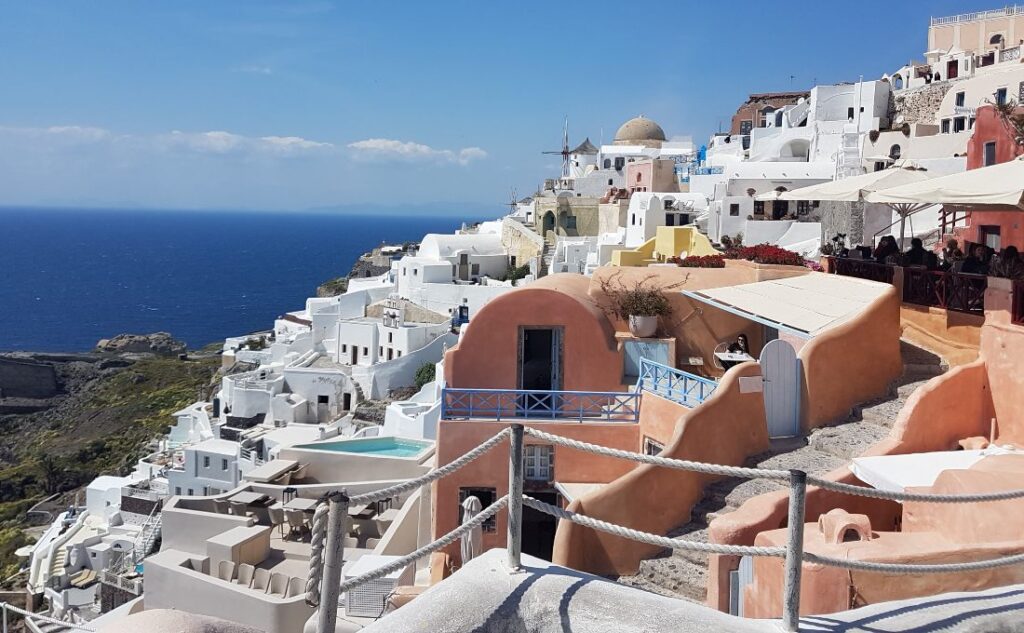
Start by soaking up the unique architecture and colors of the island, where the villages perched on the volcano rim stare into the blue horizon of the Aegean.
Amoudi Bay and Armonia Beach
Walk down the steps to Amoudi Bay and follow the path to rocky Armonia Beach for a swim (also perfect for cliff jumping) before retreating to the fish tavernas of Amoudi Bay for lunch.
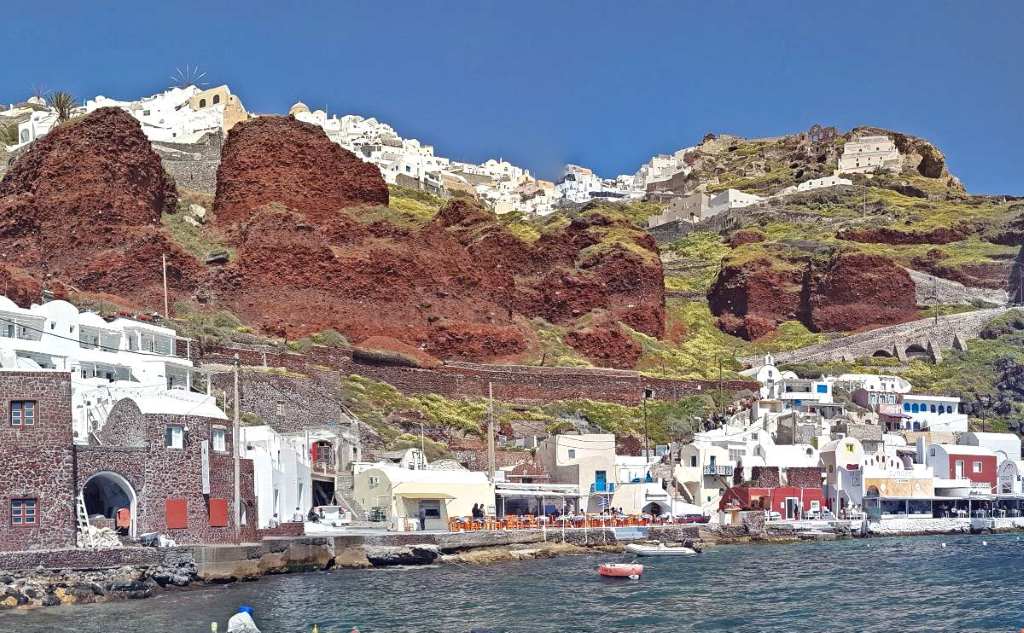
Depending on when you arrive, you’ll want to spend some more time wandering through Oia or having a drink at the restaurants perched on the edge of the caldera.
Oia Castle Sunset
End your day with the most iconic sunset in Greece observed from the Oia village, ideally from the castle of Agios Nikolaos in Oia, on the northern side of this crescent-shaped island.
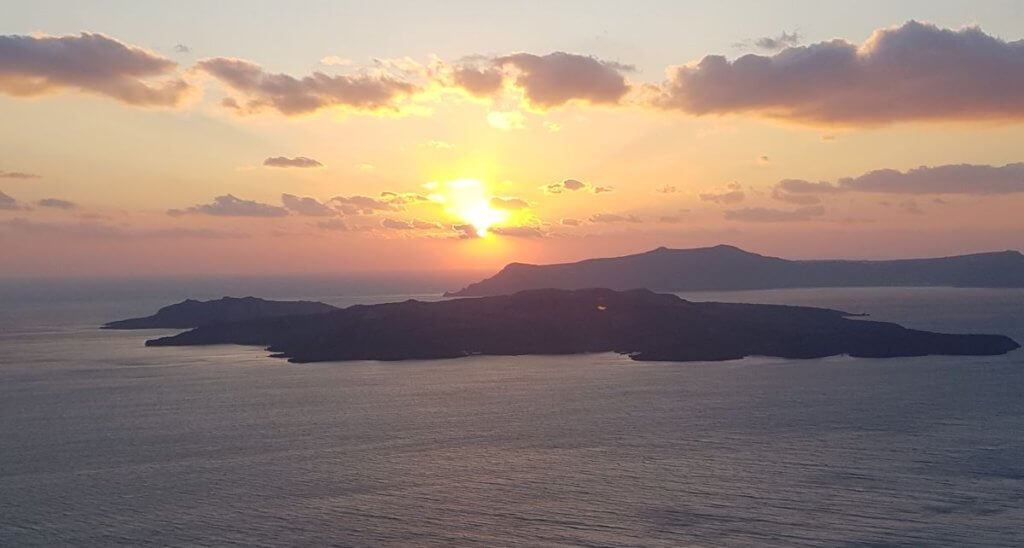
Tip: In peak summer there are hundreds of people jostling for a spot, so be patient and arrive early.
Day 8 Santorini – hike, beaches, sunset cruise
Fira to Oia hike
Start the day early with the Fira-Oia hike, the most scenic way to see Santorini’s caldera villages, its blue domed churches, narrow alleys, and the hilltop views of its many ports (one even with a cable car).
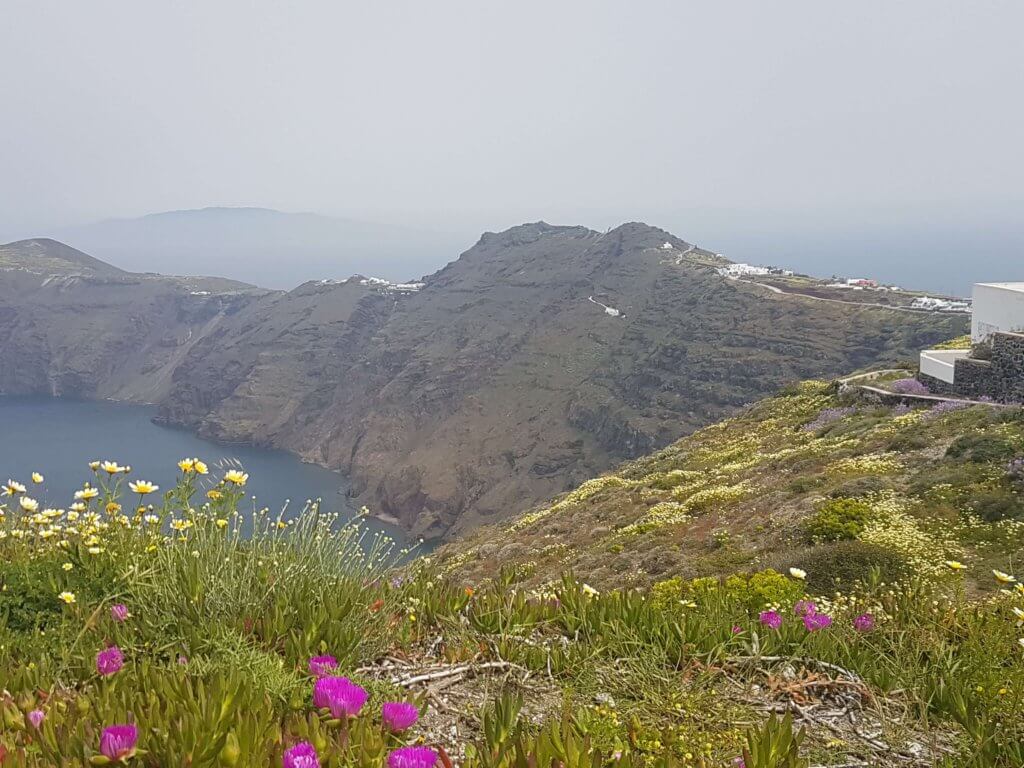
This hike is, I promise you, a major highlight, of Santorini. Follow the path along the caldera edge from Fira as there’s more downhill if you take this direction, and end in Oia.
Ancient Akrotiri and the Red Beach
In the afternoon, take a public bus or a taxi from Fira (15 minutes, €30 – €40) to visit Ancient Akrotiri – the second most famous excavations of a Minoan settlement (after the Palace of Knossos in Crete), with some five millennia-old houses and streets still standing.
Akrotiri was a super wealthy bronze age settlement that was covered in lava when the Theran volcano blew up, resulting in the 5 islands that are now Santorini and the volcanic islets, and Thirassia.
One of the contenders for the origin of the Lost City of Atlantis, you can walk the streets of this ancient village. It truly is Greece’s Pompeii.
You can get your e-ticket to the Ancient Akrotiri site here, and check out this detailed article about why visiting Ancient Akrotiri is a definite must!
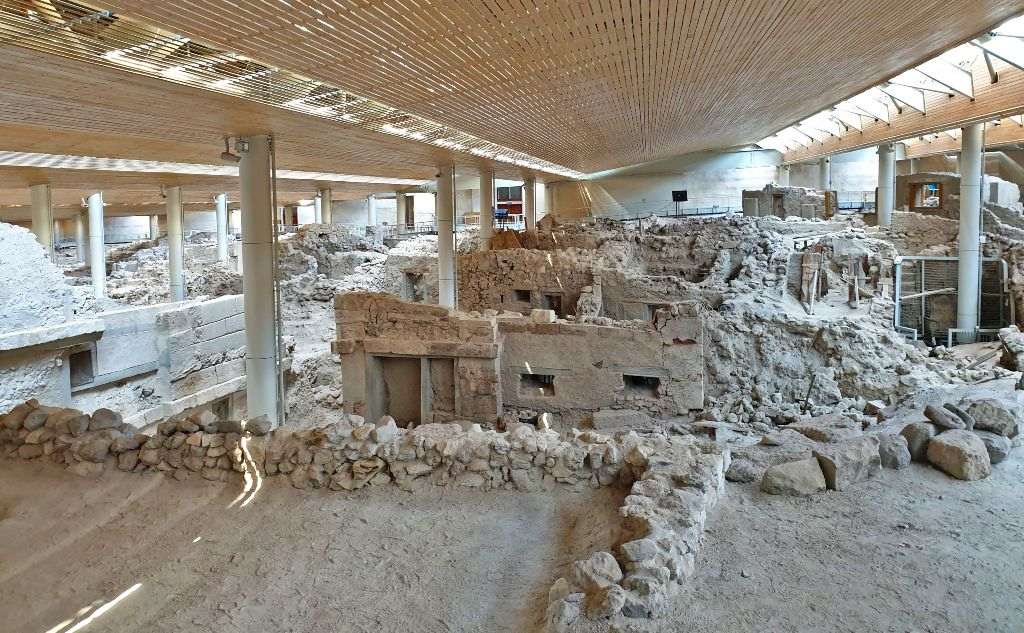
Head to some of the island’s amazing beaches with sand colors ranging from black to red. My absolute favorite is the Red Beach on Santorini’s southern end and it’s only 250 meters from Ancient Akrotiri.
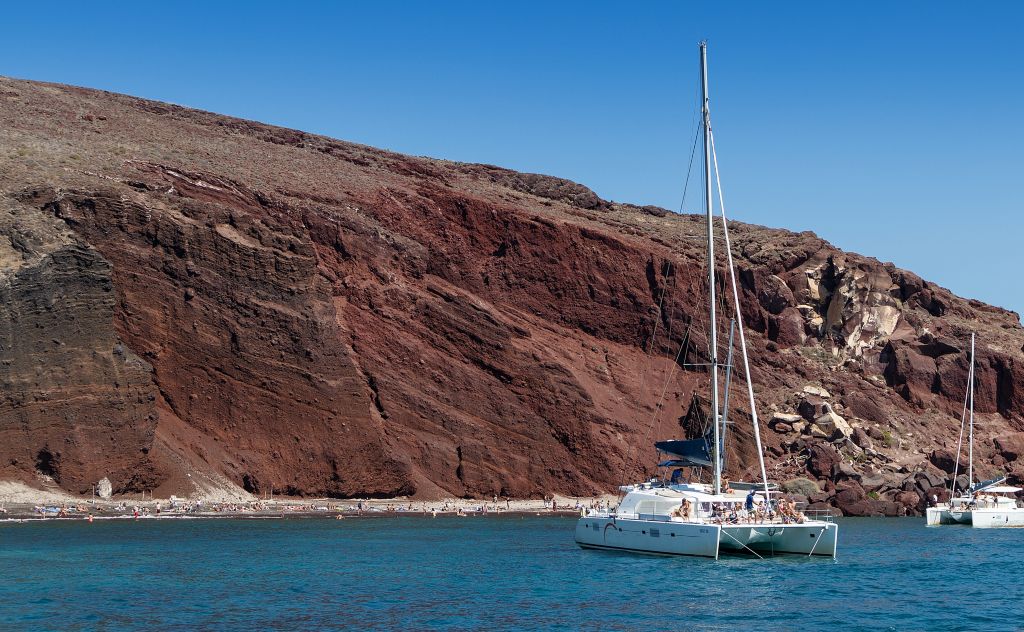
Sunset Cruise
Today or tomorrow is when you need to take a sunset boat trip around the island and to the volcano. You can leave from Vlychas Port, not far from Akrotiri, or choose a cruise that starts and ends in Oia.
⛵ Here’s a detailed guide to the best 6 Santorini boat tours.

Just make sure you end your day with a sunset cruise and raise a glass of Santorini wine to a perfect island-hopping first Greek trip.
Day 9 Santorini – inland traditional villages (in a 10-day itinerary)
Museum of Prehistoric Thera
Treat yourself to a coffee with a view before visiting the local museums of Fira – Museum of Prehistoric Thera and Lignos Folklore Museum.
(I think the Museum of Prehistoric Thera is a must, but if you’re not a huge museum fan, I’d skip the Lignos Folklore Museum on this first short trip).
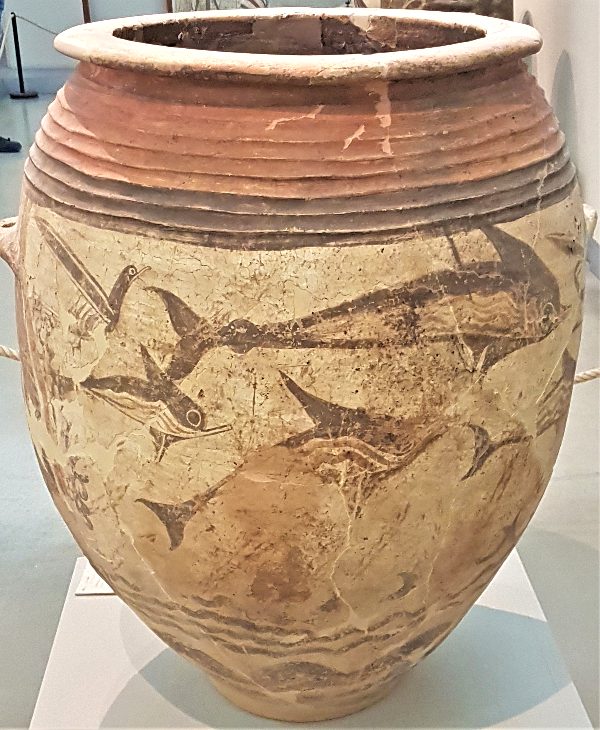
Spend the afternoon roaming Santorini’s inland villages, including Pyrgos, Emporio, and Megalochori, and book a wine-tasting tour.
Go against the current and spend the sunset golden hour in Exo Gonia village, dining in the fabulous Metaxi Mas restaurant.
The alternative is to book a sunset winetasting expiring at Santo Wines on the edge of the caldera.
Day 10 Santorini to Athens – return
Flight or Ferry?
The return trip can either be a flight directly to Athens International Airport to connect with your onward flight or else an early ferry ride to Piraeus Port which will take a minimum of 4 hours, 25 minutes.

The most practical ferry during summer leaves at 9.20 am and takes 5 and a half hours. If you’re super keen on another day in Athens, you could take the 3.55 am ferry, getting into Piraeus at 10 am.

A flight, however, will take just under an hour. In peak season there are almost two dozen a day.
Kolonaki
Depending on the time left, discover the contemporary life of this grandiose European city:
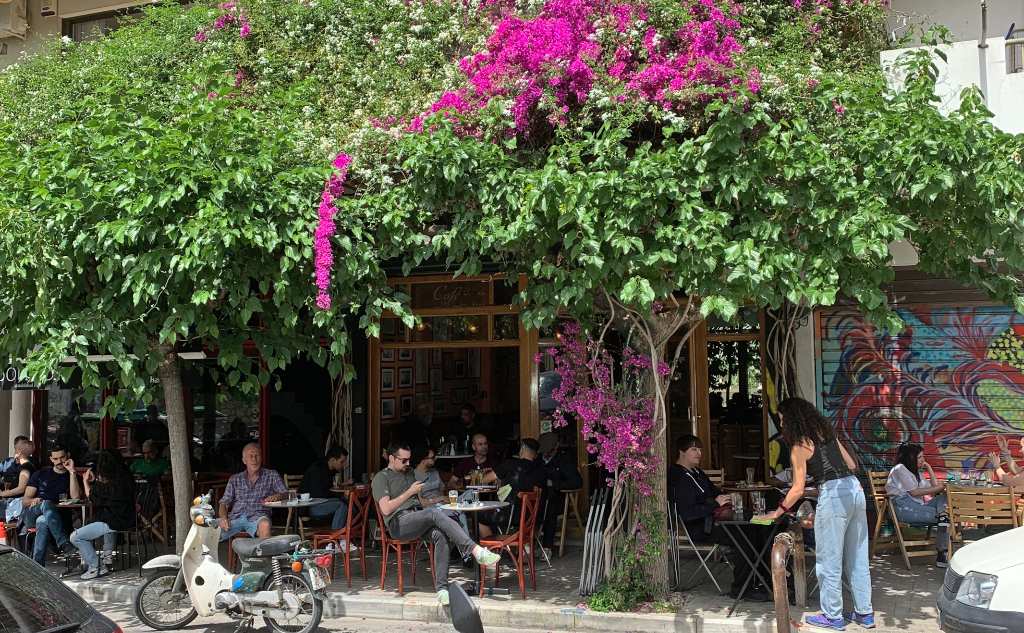
Grab a lunch in a posh Kolonaki district (or Exarcheia if you prefer the alternative urban vibe) and head to Mount Lycabettus, the capital’s second favorite hill with a wonder-making chapel on the top.
Both areas are great for shopping – Kolonaki for boutique shopping, jewelry, and art, and Exarcheia for books.
More Museums
Continue to the Pangrati area where the National Gallery and The Goulandris Museum of Modern Art are located, before hitting the cafes on Varnava Square.
Alternatively, visit some of the newcomers to the Athens’ museum scene – The Alekos Fassianos Museum, dedicated to the life and work of “Greece’s Picasso”, the Cavafy Archive Museum, or the Maria Callas Museum.
(Alternatively, visit the Museum of Cycladic Art – it’s my favorite Athens museum after the Acropolis Museum and the National Archaeological Museum.)
If you didn’t get a chance to see Kerameikos, this is a good opportunity.



